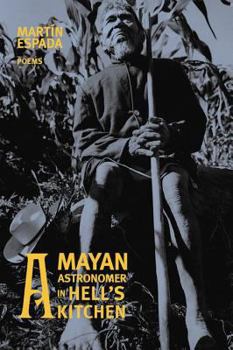A Mayan Astronomer in Hell's Kitchen: Poems
Select Format
Select Condition 
Book Overview
In his sixth collection, American Book Award winner Mart n Espada has created a poetic mural. There are conquerors, slaves, and rebels from Caribbean history; the "Mayan astronomer" calmly smoking a cigarette in the middle of a New York tenement fire; a nun staging a White House vigil to protest her torture; a man on death row mourning the loss of his books; and even Carmen Miranda.
Format:Paperback
Language:English
ISBN:0393321681
ISBN13:9780393321685
Release Date:June 2001
Publisher:W. W. Norton & Company
Length:88 Pages
Weight:0.30 lbs.
Dimensions:0.4" x 5.5" x 8.1"
Customer Reviews
2 ratings
Naming the Stars
Published by Thriftbooks.com User , 24 years ago
A MAYAN ASTRONOMER IN HELL'S KITCHEN by Martín Espada A Mayan Astronomer in Hell's Kitchen is the title of Martín Espada's new book. The title reflects the cultural and linguistic mix in which Espada lives, shuttling from his Puerto Rican heritage to Old Guard Connecticut. The book begins in Puerto Rico with the poet's relatives. These include a dying grandmother and a cousin whose stock of miracle cookware fails to heat the family dinner. About his father in Brooklyn, the poet writes: Sometimes I dream my father is a guitar, with a hole in his chest where the music throbs between my fingers ("My Father as a Guitar") Espada also writes about a magically real politician ("The Governor of Puerto Rico Reveals at His Inaugural That He Is The Reincarnation of Ponce de Leon") and the mixture of foreign birds in a luxury hotel in San Juan:The White cockatoo from Australiatwirls tricks with a hostess. . .the scarlet macaw of Brazilyammers a joke about pina coladas. . .the peacock of Indiaskitters around the koi pond. . .the frostbitten turkey from North Carolinathaws in the kitchen ("Ornithology at the Caribe Hilton") These poems range from the deadly serious to the comic. "The Carpenter Swam to Spain" is about the Spanish Civil War and "The River Will Not Testify" is about a Colonial massacre of Indians. Espada also speaks about the Rosenbergs and Mumia Abu-Jamal. Other poems can make you laugh out loud such as "Anarchism and the Parking Meter" and "Why I Went to College": If you don't, my father said, you better learn to eat soup through a straw cause I'm gonna break your jaw. The book's best combination of social commentary and humor, as well as the most intense cultural conflict, occurs in Connnecticut where Espada's in-laws have been resident since 1680. At Thanksgiving, he silently compares the New England fare to the "turkey with arroz y habichuelos and plátanos" he grew up with. Later, his father-in-law hauls out a small cannon and fires it at some old tombstones; "This way, if I hit anybody, / they're already dead." The poet concludes: "When the first / drunken Pilgrim dragged out the cannon at the first Thanksgiving - / that's when the Indians left." ("Thanksgiving"). With humor, Espada compares the father-in-law's lack of value for his cultural heritage with the poet's own sense of the past. Espada has serious things to say, but he is not preaching. His language is direct and pulls the reader along through images of both personal and political history. This book shows that Mr. Espada is a mature poet who continues to offer readers a great variety.
Surreal Poet on Real Fire
Published by Thriftbooks.com User , 24 years ago
Martin Espada's tumultous language rushes forward in this unforgettable sixth collection of firey work: white heat surrounded by the cooler, blue streaks of history. Rather than hold a mirror up to the broken time-barrier of his people's seemingly eternal struggle, he captures it by the hair of its head and drags it onto the page where it still lives, thrashing. Emotive and layered with textural surreal images, his words continue to carry the torch through the subterranean tunnels of fresh consciousness, where the shadows first cast by Neruda still dance. He is a worthy carrier of that kind of genuine magic. His is a poetry of sharp blades that cuts through the toughest-rooted dream territory, as we see in "The Shiny Aluminum of God:" "The scar carves her husband's forehead/ where the doctors scooped the tumor out,/ where cancer cells scramble like a fistful of ants." No other present-day Mayan, or present-day prophet, for that matter, writes with such warp and texture. Warning: the poet talks texture at the table: the communion table of collective consciousness. Because he seems to hear more and see more than other spiritual chroniclers, his readers can be with "the preacher who first heard the savior's voice/ bleeding through the plaster of the jailhouse." He is one who has a gift to let the blood speak-- to let the truth seep through. The title is appropriate; he may well chart the stars of the past and future, and his poems are our hotline to his vision in Hell's Kitchen. Espada never shies away from the drama of his subject matter. Each poem is loaded with the special energy that only he can impart. The message is usually violent, requiring a sizeable talent which has yet to let us down.






